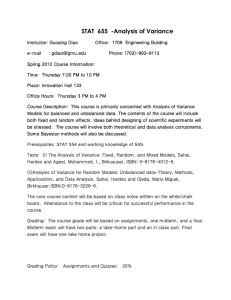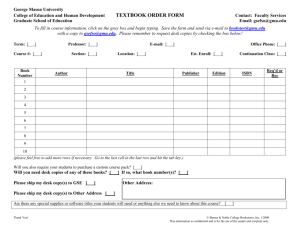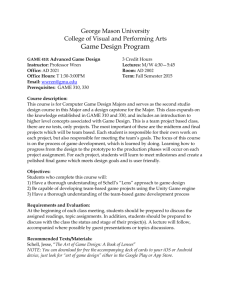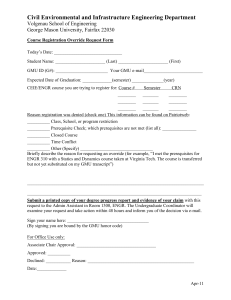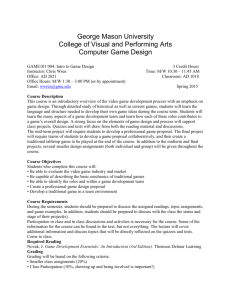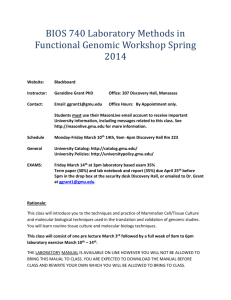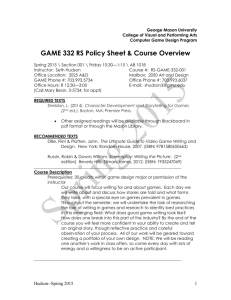Game 330 Wren - GMU Game Design
advertisement
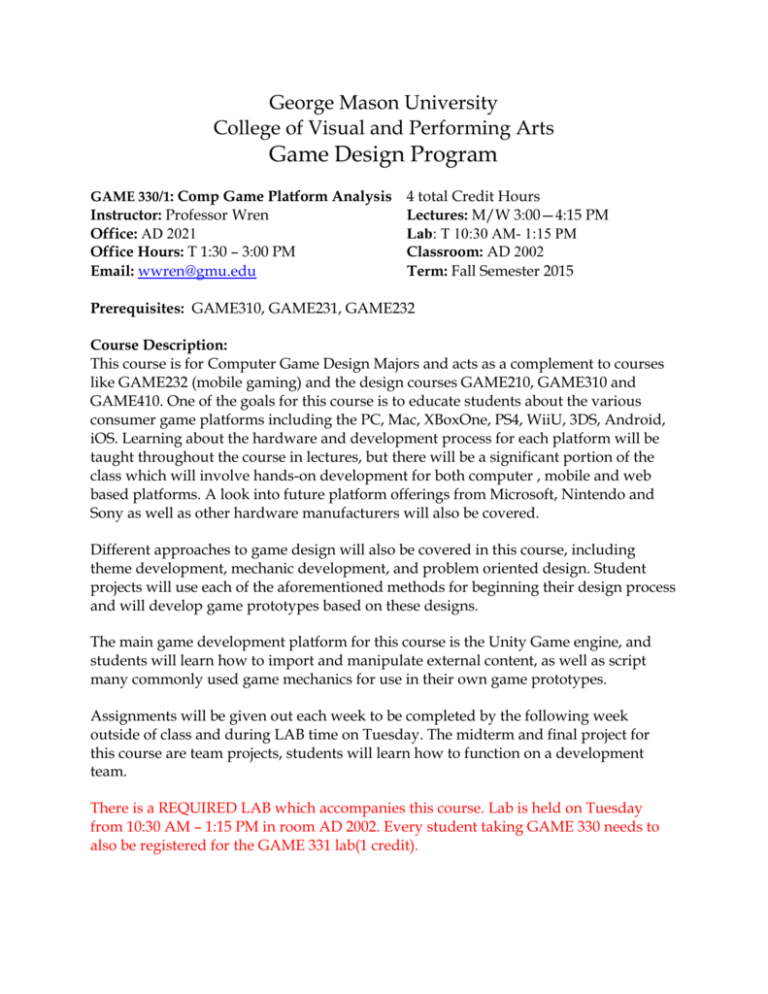
George Mason University College of Visual and Performing Arts Game Design Program GAME 330/1: Comp Game Platform Analysis Instructor: Professor Wren Office: AD 2021 Office Hours: T 1:30 – 3:00 PM Email: wwren@gmu.edu 4 total Credit Hours Lectures: M/W 3:00—4:15 PM Lab: T 10:30 AM- 1:15 PM Classroom: AD 2002 Term: Fall Semester 2015 Prerequisites: GAME310, GAME231, GAME232 Course Description: This course is for Computer Game Design Majors and acts as a complement to courses like GAME232 (mobile gaming) and the design courses GAME210, GAME310 and GAME410. One of the goals for this course is to educate students about the various consumer game platforms including the PC, Mac, XBoxOne, PS4, WiiU, 3DS, Android, iOS. Learning about the hardware and development process for each platform will be taught throughout the course in lectures, but there will be a significant portion of the class which will involve hands-on development for both computer , mobile and web based platforms. A look into future platform offerings from Microsoft, Nintendo and Sony as well as other hardware manufacturers will also be covered. Different approaches to game design will also be covered in this course, including theme development, mechanic development, and problem oriented design. Student projects will use each of the aforementioned methods for beginning their design process and will develop game prototypes based on these designs. The main game development platform for this course is the Unity Game engine, and students will learn how to import and manipulate external content, as well as script many commonly used game mechanics for use in their own game prototypes. Assignments will be given out each week to be completed by the following week outside of class and during LAB time on Tuesday. The midterm and final project for this course are team projects, students will learn how to function on a development team. There is a REQUIRED LAB which accompanies this course. Lab is held on Tuesday from 10:30 AM – 1:15 PM in room AD 2002. Every student taking GAME 330 needs to also be registered for the GAME 331 lab(1 credit). Objectives: Students who complete this course will: 1) Have a thorough understanding of the design benefits/challenges of the major gaming platforms 2) Be capable of C# scripting simple game mechanics in the Unity engine 4) Have a working understanding of the Unity engine layout/ development pipelines 5) Have completed several game projects in team environment and be capable of working effectively on future development teams 6) Know the importance and process of both self and peer evaluations within a game development environment. 7) Be able to publish games for the PC/Mac/Web and Android Platforms using the Unity Engine Requirements and Evaluation: At the beginning of each class meeting, students should be prepared to discuss the assigned readings and topic assignments. Any assignments will be due at the time specified on Blackboard or otherwise specified by your instructor. Late assignments will lose 10% of their grade each day they are late. When appropriate, students should be prepared to discuss with the class the status and stage of their project(s). Lectures/Tutorials will follow, accompanied where possible by guest presentations or topics discussions. Recommended Texts/Materials: Book: Unity 3.x Game Development Essentials Author: Will Goldstone ISBN: 978-1-84969-144-4 Book: Introduction to Game Design, Prototyping, and Development: From Concept to Playable Game with Unity and C# Author: Jeremy Gibson ISBN: 978-0-32193-316-4 There is NO required book for this course, all instruction will be given in class on through Blackboard online portal. While not required, you may purchase this book online (digital or non-digital version), this is the first semester I have not ordered them to the bookstore. All reading and other assignments will be given in class or via Blackboard. Also it is required that each student have access to a PC Desktop/Laptop – for project and coursework outside of class. Mac/Apple computers can be used for homework/projects with the Unity engine, but all assignments must be submitted in Windows format. Recommended Materials: USB Flash Drive – 2 GB for storing and transporting project data Grading: Grading will be based on class participation (10%), midterm project (20%), in-class/lab projects (30%), and the final presentation and project (40%). To receive a grade of "A" a student must achieve a minimum average grade of 90% on the course work requirements. To receive a grade of "B" a student must achieve a minimum average grade of 80% on the course work requirements. To receive a grade of "C" a student must achieve a minimum average grade of 70% on the course work requirements. To receive a grade of "D" a student must achieve a minimum average grade of 60% on the course work requirements. Failure to receive a "D" grade will result in a grade of "F". Note on Peer Evaluations: During this course, students will be working on teams for smaller in-class projects, the mid-term project, and the final project. As part of this process, each student will need to assess their own performance as well as that of their peers to learn the critical skills of working on a game development team and to improve their own performance. Peer evaluations will affect the grades you receive for these projects, the majority of the grading will be done according to the following rubric for most class projects: Game Project Rubric: 50% Requirements: Each project will have a set of requirements; these may be scripts, behaviors or specific content which needs to be present in the game created. Are all of the required components included? Are they implemented properly? Full credit in this category will be given if all requirements are met and implemented properly (requirements will vary from project to project, but will be made clear when project is assigned) Missing one or more requirements, not implementing them properly, or not being able to demonstrate them in your project will erode this portion of the grade. For example, if there were 5 requirements for a given project, and your team only implemented 4 of them, your team would lose 20% on this section (10% of the overall grade for the project) So be sure to check the requirements and also that you can demonstrate them in your final delivered product. 20% Fulfilling the Design Does the final product meet the goals of the design? (Each project will be preceded by a design phase, it is the goal of the product to meet the goals of the design) Your team will state its design goals clearly during the design phase and they will be approved by your instructor. The design phase of a project includes its own set of requirements: milestones/reports/prototypes. To receive full credit in this section teams must meet these design requirements as assigned. While changes to the design do occur naturally as part of the development process, each change must be justified by a prototype, or report which explains why a change was made to the design. Success in this area will be measured in your team’s ability to demonstrate how your game meets its design goals, and, if necessary, show evidence of any changes to the design with justification. 15% Aesthetic How easy to use was the final product? How aesthetically pleasing were the graphics, special effects, UI, sound effects/music and menu options? Projects which have poorly constructed levels, artwork which does not keep with theme or is poorly implemented, and a lack of user-friendly devices (such as instructions, checkpoints etc.) will lose points in this area. I do not expect the level of detail seen in most professional games, but the artwork and other aesthetics used should be clean, consistent and in keeping with the design and theme. 15% Teamwork Teamwork refers to how well your team functioned during the course of this project. Was there good coordination for designing the product, assigning tasks, meeting milestones? Was communication strong throughout the process for your team? Did your team divide up tasks evenly? Did all of your team members participate in the design process? Did your team meet often enough to complete tasks, make decisions and complete milestones? Other project elements which may skew your project grade: Peer Evaluations You will rate/rank your team members as well as yourselves and state who did what for a given project. Having a high rating by your teammates can improve your score for a project, likewise, having a low rating by your teammates can decrease your score. For example, if your team receives a “B” overall on your project, but all of your teammates consider your effort to be exceptional, you might end up with an “A” on the project. Historically the things that will affect your team’s rating of you are: Punctuality (shows up for team meetings) Reliability (gets his/her tasks done in a timely manner) Leadership (rallies team, coordinates team meetings, game integrations, play sessions) Quality (the work completed is of a very high level of quality, whether art or code) Technical Difficulty: What is the technical difficulty of the project? I encourage students to be ambitious, but to also control the scope of projects based on what is possible in a limited timeframe. Project designs which go above and beyond the requirements of a project either technically or aesthetically will be rewarded. Note of caution: a very ambitious project still needs to be completed, so while ambition is good, be certain you can complete the project and meet the requirements regardless of the technical difficulty your team decides on for a given project. ACADEMIC INTEGRITY The integrity of the University community is affected by the individual choices made by each of us. GMU has an Honor Code with clear guidelines regarding academic integrity. Three fundamental and rather simple principles to follow at all times are that: (1) all work submitted be your own; (2) when using the work or ideas of others, including fellow students, give full credit through accurate citations; and (3) if you are uncertain about the ground rules on a particular assignment, ask for clarification. No grade is important enough to justify academic misconduct. Plagiarism means using the exact words, opinions, or factual information from another person without giving the person credit. Writers give credit through accepted documentation styles, such as parenthetical citation, footnotes, or endnotes. Paraphrased material must also be cited, using MLA or APA format. A simple listing of books or articles is not sufficient. Plagiarism is the equivalent of intellectual robbery and cannot be tolerated in the academic setting. If you have any doubts about what constitutes plagiarism, please see me. As in many classes, a number of projects in this class are designed to be completed within your study group. With collaborative work, names of all the participants should appear on the work. Collaborative projects may be divided up so that individual group members complete portions of the whole, provided that group members take sufficient steps to ensure that the pieces conceptually fit together in the end product. Other projects are designed to be undertaken independently. In the latter case, you may discuss your ideas with others and conference with peers on drafts of the work; however, it is not appropriate to give your paper to someone else to revise. You are responsible for making certain that there is no question that the work you hand in is your own. If only your name appears on an assignment, your professor has the right to expect that you have done the work yourself, fully and independently. GMU is an Honor Code university; please see the Office for Academic Integrity for a full description of the code and the honor committee process. The principle of academic integrity is taken very seriously and violations are treated gravely. What does academic integrity mean in this course? Essentially this: when you are responsible for a task, you will perform that task. When you rely on someone else’s work in an aspect of the performance of that task, you will give full credit in the proper, accepted form. Another aspect of academic integrity is the free play of ideas. Vigorous discussion and debate are encouraged in this course, with the firm expectation that all aspects of the class will be conducted with civility and respect for differing ideas, perspectives, and traditions. When in doubt (of any kind) please ask for guidance and clarification. MASON EMAIL ACCOUNTS Students must use their MasonLIVE email account to receive important University information, including messages related to this class. See http://masonlive.gmu.edu for more information. All digital communication with the professor must be made using your “masonlive” email account. OFFICE OF DISABILITY SERVICES If you have a documented learning disability or other condition that may affect academic performance you should: 1) make sure this documentation is on file with Office of Disability Services (SUB I, Rm. 4205; 993-2474; http://ods.gmu.edu ) to determine the accommodations you need; and 2) talk with me to discuss your accommodation needs. If you are a student with a disability and you need academic accommodations, please see me and contact the Office of Disability Services (ODS) at 993-2474, http://ods.gmu.edu. All academic accommodations must be arranged through the ODS. If you have a learning or physical difference that may affect your academic work, you will need to furnish appropriate documentation to the Office of Disability Services. If you qualify for accommodation, the ODS staff will give you a form detailing appropriate accommodations for your instructor. In addition to providing your professors with the appropriate form, please take the initiative to discuss accommodation with them at the beginning of the semester and as needed during the term. Because of the range of learning differences, faculty members need to learn from you the most effective ways to assist you. If you have contacted the Office of Disability Services and are waiting to hear from a counselor, please tell me. DIVERSITY George Mason University promotes a living and learning environment for outstanding growth and productivity among its students, faculty and staff. Through its curriculum, programs, policies, procedures, services and resources, Mason strives to maintain a quality environment for work, study and personal growth. An emphasis upon diversity and inclusion throughout the campus community is essential to achieve these goals. Diversity is broadly defined to include such characteristics as, but not limited to, race, ethnicity, gender, religion, age, disability, and sexual orientation. Diversity also entails different viewpoints, philosophies, and perspectives. Attention to these aspects of diversity will help promote a culture of inclusion and belonging, and an environment where diverse opinions, backgrounds and practices have the opportunity to be voiced, heard and respected. The reflection of Mason’s commitment to diversity and inclusion goes beyond policies and procedures to focus on behavior at the individual, group and organizational level. The implementation of this commitment to diversity and inclusion is found in all settings, including individual work units and groups, student organizations and groups, and classroom settings; it is also found with the delivery of services and activities, including, but not limited to, curriculum, teaching, events, advising, research, service, and community outreach. Acknowledging that the attainment of diversity and inclusion are dynamic and continuous processes, and that the larger societal setting has an evolving sociocultural understanding of diversity and inclusion, Mason seeks to continuously improve its environment. To this end, the University promotes continuous monitoring and self-assessment regarding diversity. The aim is to incorporate diversity and inclusion within the philosophies and actions of the individual, group and organization, and to make improvements as needed. OTHER USEFUL CAMPUS RESOURCES: WRITING CENTER: A114 Robinson Hall; (703) 993-1200; http://writingcenter.gmu.edu UNIVERSITY LIBRARIES “Ask a Librarian” http://library.gmu.edu/mudge/IM/IMRef.html COUNSELING AND PSYCHOLOGICAL SERVICES (CAPS): (703) 993-2380; http://caps.gmu.edu LIST OF STUDENT SUPPORT RESOURCES ON CAMPUS: http://ctfe.gmu.edu/teaching/student-support-resources-on-campus/ UNIVERSITY POLICIES The University Catalog, http://catalog.gmu.edu, is the central resource for university policies affecting student, faculty, and staff conduct in university academic affairs. Other policies are available at http://universitypolicy.gmu.edu/. All members of the university community are responsible for knowing and following established policies. GMU HOLIDAY CALENDAR http://ulife.gmu.edu/calendar/religious-holiday-calendar/
